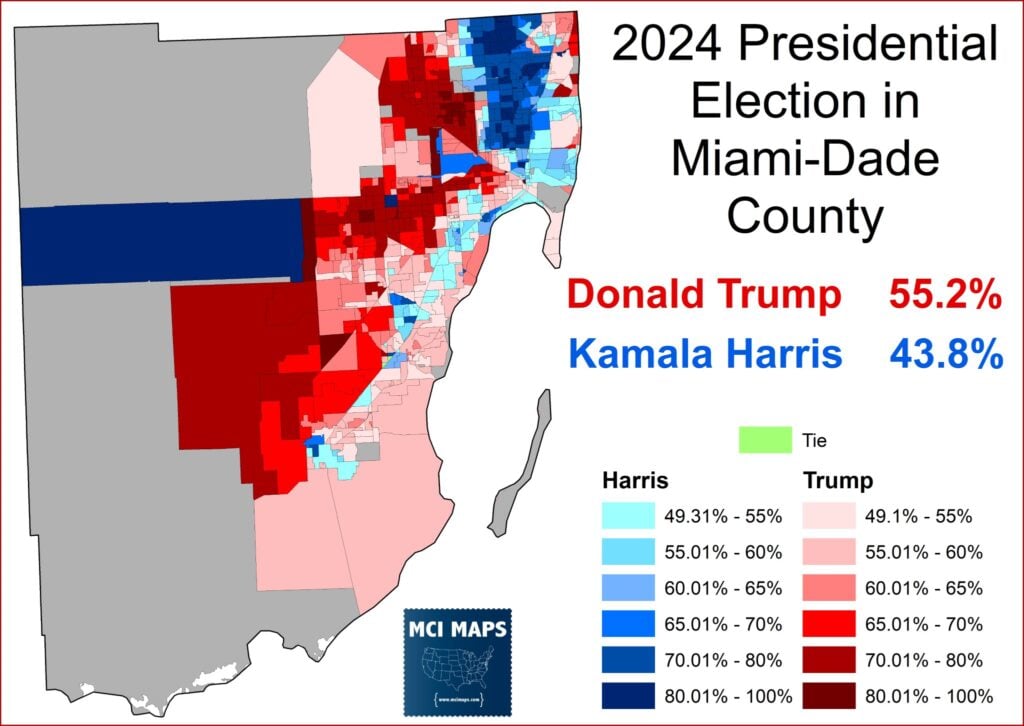We support our Publishers and Content Creators. You can view this story on their website by CLICKING HERE.
Edison Research’s exit poll shows a significant increase in support for Donald Trump among Hispanic voters, rising 14 percentage points since 2020 to reach 46%.
This level of support is one of the highest for a Republican among Hispanics in decades, even surpassing the 44% George W. Bush achieved in 2004.
Additionally, Trump’s support grew among young voters (ages 18 to 29) by 7 points.
In Pennsylvania, where Hispanic voters make up about 5% of the electorate, Trump received 42% of the Hispanic vote, compared to the 27% he garnered in 2020 against Joe Biden.
While the numbers may shift as more votes are counted, these polls reflect trends that align with BBC’s analysis of Hispanic disaffection with the Democratic Party.
In Pennsylvania’s “Hispanic Belt,” an industrial corridor that has leaned Republican in recent elections, voters like Samuel Negrón, a sheriff in Allentown and a member of the Puerto Rican community, attribute this shift to a preference for the economic and social conditions of four years ago.
Other Trump supporters in the now-majority Hispanic city cited family values and social issues as factors strengthening their alignment with the Republican Party.
The economy, which two-thirds of voters view as in poor condition, appears to be a key factor in Trump’s support, especially among the working class and in high-density Hispanic areas.
In Michigan, for example, Trump won 60% of the Hispanic vote, while Kamala Harris only achieved 35%.
Trump’s stance on illegal immigration and commitment to conservative values also drew Hispanic voters.
In key states like Arizona, new voters like Arturo Laguna emphasized their preference for Trump’s conservative stance, particularly on family values and restricted access to abortion.
In Osceola County, Florida, with a 57% Hispanic population, primarily Puerto Rican, Trump also won by more than 2,500 votes, dispelling any doubts about how this community would react to the tasteless jokes made by a comedian days before the election at a campaign event in New York. This demonstrates two things: first, that Hispanics don’t believe the lies from the media, and second, that they are not a monolithic group and do not belong to the Democrats.
In Miami, a historic result was also achieved, and Miami-Dade County turned Republican for the first time since 1988.

However, some progressive media have attributed this support to factors like racism and misogyny among Hispanics, especially among men. Finally, in a nod to identity,
Also, important Trump asked his supporters whether they preferred the term “Hispanic” or “Latino,” and the response was clear: “We are HISPANICS, not Latinos.” This distinction underscores the difference between Hispanic identity and left-leaning narratives that sometimes attempt to separate South American Hispanics from those of European descent.
María Herrera Mellado es una abogada de EE.UU. y licenciada en España. Doctora en Ciencias Jurídicas y Analista política. La Dra. Herrera es conocida por su amplia experiencia en análisis y consultas en el diseño de políticas públicas, propuestas de ley y gestión en relaciones internacionales.
Su reconocimiento proviene de sus contribuciones al análisis y representación legal de diversas organizaciones, empresas e individuos que han visto abusados sus derechos humanos, su privacidad o en la inclusión de políticas efectivas fundamentalmente en el ámbito de la transparencia y la rendición de cuentas, así como la lucha contra la corrupción.
Su formación académica y experiencias profesionales la convierten en una voz respetada en el debate público y en el análisis de temas de actualidad sobre todo en los desafíos políticos y legales contemporáneos.
María Herrera Mellado is a U.S.-based attorney also licensed in Spain. She holds a PhD in Legal Sciences and is known as a media legal and policy analyst.
Dr. Herrera is recognized for her extensive experience in analyzing and consulting on public policy design, legislative proposals, and international relations management.
Her recognition stems from her contributions to the analysis and legal representation of various organizations, companies, and individuals whose human rights or privacy have been violated, or who have benefited from the inclusion of effective policies, primarily in the areas of transparency, accountability, and the fight against corruption.
Her academic background and professional experience make her a respected voice in public debate and in the analysis of current issues, particularly in contemporary political and legal challenges.

 Conservative
Conservative  Search
Search Trending
Trending Current News
Current News 





